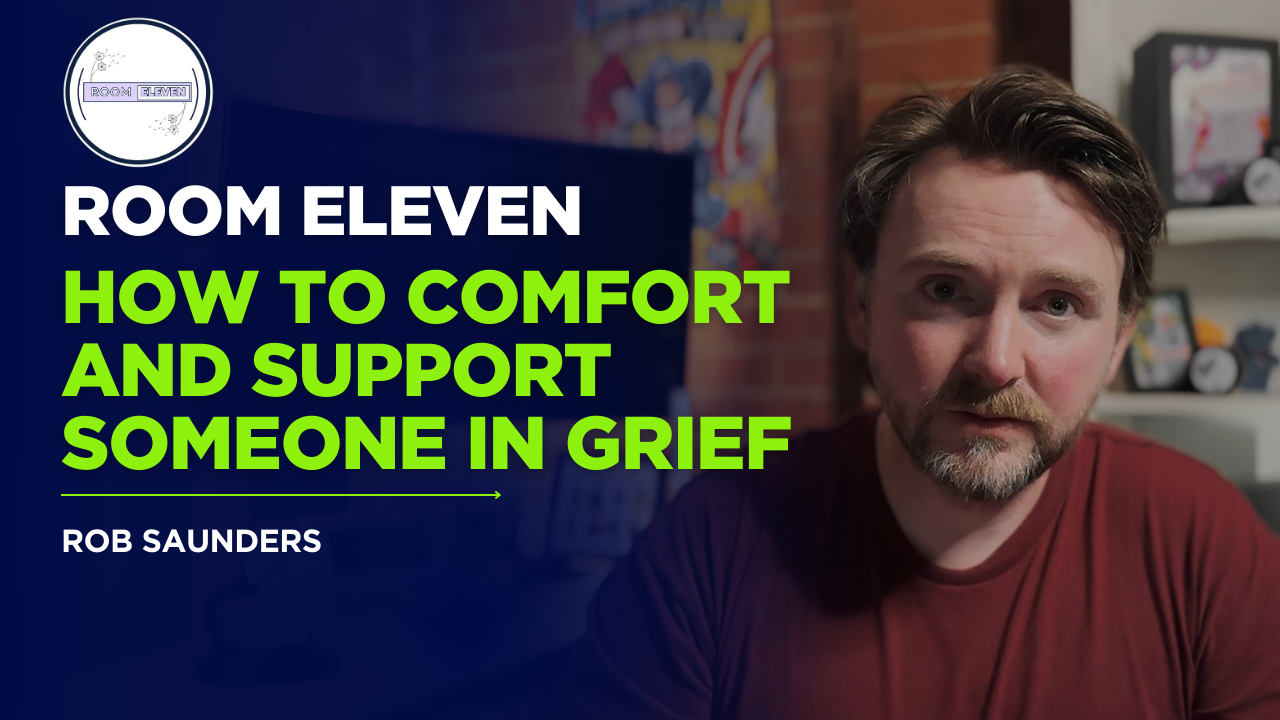News from the Room
How to Comfort and Support Someone in Grief
Grief is one of the few experiences in life that is universal, crossing cultures, languages, and time. But despite this universality, every time we grieve, it feels deeply personal and unique to every individual in which that loss touches.
In my early years, I had experienced grief in many forms. Through the loss of extended family members, peers from school and the loss of close relationships. All impacted me in subtle ways, and each was a unique experience.
But when we lost our daughter Billie, the grief was so concentrated it was almost too hard to comprehend. An overwhelming mix of despair, sorrow, and love. It reshaped who I am in ways I am still figuring out. Later, when my Nana passed, it was another different but no less profound loss. She had been one of the foundational pillars of my upbringing, helping my mother to raise me into the person I am today, and also for my siblings, and my cousins when all our parents were dealing with divorce.
All these experiences taught me not only about grief but also about how the people around us can help shape us, or unintentionally break us, as we navigate loss.
So, how can we truly support someone who is grieving?
Understanding Grief
Grief is an experience that impacts us on emotional, physical, and relational levels. It is not just sadness; like an ocean, with it’s many currents and storms, grief is a complex ocean of feelings, thoughts, and even physical sensations that can overwhelm us.
As I mentioned earlier, losing Billie brought waves of despair, sorrow, and love that were deeply intertwined. It was a profound and raw grief, rooted in a future we never got to share. Conversely, when my Nana passed, the grief carried a layer of nostalgia. Her loss felt like the ending of a book, but I wasn’t ready for it to end. It was a goodbye to the woman who had been a cornerstone, a matriarch of our family during some challenging times. She wasn’t just my grandmother; in those early years, the formative years, she was almost a second parent, a steady presence helping guide me, my siblings, and my cousins.
These experiences have taught me that grief is as individual as a fingerprint. Each loss is different because each relationship is different. What comforts one person might alienate another, and there is no “one-size-fits-all” approach to navigating or supporting someone through it.
Practical tips for supporting a grieving friend or family member
“Be Present, Not Perfect”
When someone you love is grieving, it’s natural to want to help, but all too often, we trip over ourselves trying to find the perfect thing to say or do. The truth is, grieving people don’t need the perfect response or the perfect answers.
They just need you.
The Power of Just Showing Up
You don’t need grand over the top gestures, or a Pulitzer Prize winning speech prepared. Just being there is more than enough. Sit with them, have a cup of tea together, or simply share a quiet moment.
Your presence says, I see you, and I’m here. Sometimes, that’s all that’s needed.
Stop Trying to “Fix” It
Grief isn’t a problem you can solve. Trust me, I’ve tried. After the loss of our daughter, I approached grief like a video game, thinking if I forced myself through the stages of grief, one by one, I’d eventually reach the final level, “acceptance,” and everything inside me would be fixed. But grief doesn’t work that way.
It’s not a problem to solve; it’s a lifelong journey you learn to carry with you.
And honestly, when we try to fix grief instead of allowing it to simply exist, we often say or do the wrong things. Phrases like “At least...” or “Look on the bright side” might come from a place of care, but they can hurt more than they help. Instead, focus on the simplicity of acknowledgment: “I’m so sorry,” or “I can’t imagine how hard this is, but I’m here.” Sometimes, just being there is enough.
Listen First
It’s natural to want to jump in with advice or share your own stories first, but try to resist that urge, unless they ask for it. Just listen. Let them vent, cry, or even sit in silence if that’s what they need.
Sometimes, the best way to support someone is simply to give them the space to feel, without interruption or expectation. That quiet presence can mean more than any words ever could.
The Little Things Matter
Supporting a loved one doesn’t have to be overwhelming or exhausting. Small, thoughtful gestures can make a world of difference. A quick text to check in, dropping off a meal, or remembering their loved one’s birthday can have more impact than you might realise.
It’s not about grand gestures, it’s about showing you care, consistently and quietly. Those little acts of kindness are what truly help.
Be Practical
Grieving people can feel overwhelmed by the everyday stuff. Just trying to make a decision on dinner can be a marathon effort. So rather than saying, “Let me know if you need anything,” offer something specific: “Can I drop off dinner on Tuesday?” or “Do you want me to take the kids for a bit this weekend?” Practical help is a way to lighten the load without them having to ask.
Embrace the Awkwardness
Grief is messy, and it’s okay if you feel awkward. Lean into that discomfort. Silence, tears, and not having all the answers are part of the process.
The important thing is to show up anyway.
Acknowledge Their Loved One
Say their name. Share a story. Ask about their favourite memories. Too often, people avoid mentioning the person who has passed, fearing it will hurt more, but for someone grieving, hearing their loved one’s name is a gift. It shows they’re remembered.
Their name is a magic word, say it, hear it, remember it.
Be Patient
Grief doesn’t run on a schedule. It doesn’t disappear after the funeral or in six months or even a year. It ebbs and flows like water, sometimes the tides out and there’s room to walk around, other times the tides in and they can be stuck clinging to the rocks. Check in long after everyone else has stopped. They’ll appreciate it more than you know.
Being present, not perfect, means putting aside the pressure to have all the answers and focusing on what truly matters: showing up with love, compassion, and a willingness to walk beside them in their grief.
It’s not about saying the perfect thing or being the perfect friend, it’s about being there. That’s what makes all the difference.
Avoid Platitudes
Well-meaning phrases like “everything happens for a reason” or “they’re in a better place” can unintentionally cause pain. When we lost our daughter Billie, these statements felt dismissive of the life we had lost.
Empathy is far more valuable than explanations. A simple, “I’m so sorry for your loss” or “I’m here for you” goes a lot further.
Offer Practical Help
Grief can make even the smallest tasks feel overwhelming. After Billie died, we retreated indoors, isolating ourselves from the world. During this time, it was the practical, thoughtful gestures from loved ones, dropping off groceries, delivering home-cooked meals, and running errands on our behalf that made all the difference.
Knowing we could hibernate in our home without worrying about everyday responsibilities had a profound impact on our initial healing journey.
Listen Without Judgment
Talking about Billie and my Nana helped me, and other family members, process our loss. It wasn’t about finding answers or solutions, it was about having someone who would simply listen. The gift of a compassionate conversation is one of the most healing things you can offer to someone on this journey.
Listening also strengthens relationships. When you truly listen, you show you care. You create a safe space for the grieving person to share their feelings, memories, and even fears without worrying about being judged or “fixed.” Sometimes, the greatest comfort lies in being heard.
So In Closing
Supporting someone in grief isn’t about having the perfect words or fixing what’s broken.
It’s about showing up with love, compassion, and a willingness to walk beside them on their journey.
The 411
This Week at Room Eleven
The Still Parents Podcast
Monday started early for me this past week as I had the privilege of being a guest on the UK’s Still Parents Podcast. For those who read last week’s newsletter, you might recall I mentioned this opportunity.
On the episode, I shared Billie’s story and reflected on those raw, early days of grief after losing her. I also spoke about our subsequent pregnancies and the critical role advocacy plays in ensuring the wellbeing of your unborn baby.
Now, I’ll be honest: I don’t remember if my thoughts were entirely cohesive. I tend to ramble when I’m passionate about something, often wandering off on tangents (mental note: maybe it’s time to get tested for ADHD?).
We also touched on my 366 day run last year and my plans for this year’s endurance challenge. While the details are still being worked out, I’ll keep you in the loop as things come together.
Overall, it was a fantastic experience. I’m so grateful to have been part of it. The work Still Parents does to create awareness around baby loss and foster a safe space for vulnerability, particularly for men, is nothing short of inspiring.
Grief, Growth & Resilience Video Series: Episode 2
I’ve recorded episode two of the series and am currently working on the edits. Once it’s ready, you’ll get early access of this video in your inbox next week.
In the meantime, I’d love to hear your thoughts on episode one. Did you find it helpful? Are there any specific topics you'd like me to cover in future episodes?
Drop your ideas in the comments, I’d really value your input.
Weekly Musings
What I’m Reading: The Let Them Theory by Mel Robbins
As hinted at in last week’s newsletter, I’ve been diving into The Let Them Theory by Mel Robbins. I’m halfway through, and while many of the concepts aren’t brand-new, her framing feels incredibly validating and easy to relate to.
One part that really hit home was when she spoke about grief. Robbins describes emotions in a way that mirrors my own visualisation. About how they come in waves. She emphasises the importance of letting emotions in, sitting with them, and then managing them in a way that’s healthy for you. It’s such a simple yet profound approach, and it’s been resonating deeply.
There’s also some good insights about adult friendships that I’m finding interesting.
What I’m Watching: Parenthood (1989)
Parenthood is one of those movies that, every time I watch it, I connect with different characters and view the film from a completely new perspective.
One of my fondest childhood memories is of my sister and me spending weekends watching movies back-to-back. Wearing out the tapes of Back to the Future, Ferris Buellers Day off, Ninja Turtles and a bookcase full of other videos. And Parenthood was a regular on our VHS rotation. Back then, we’d laugh at the comedic genius of Steve Martin and spend the rest of the day reciting the "diarrhea song" the kids sing at the start of the movie.
At that age, I resonated most with Kevin, the neurotic son. Like him, I was an anxious kid, prone to overthinking and overanalyzing. I was called a “worry wart” more times than I can count.
In my teenage years, I found myself relating more to Gary and Tod, trying to navigate adolescence, wrestling with my youth, and yearning to be seen as an adult.
Now, in my thirties, with children of my own, I realise how much Steve Martin’s character, Gil, has shaped my perspective as a father. Gil’s approach to parenthood, to be there for his kids as much as possible, to the best of his ability, while juggling life’s responsibilities, is deeply inspiring. His efforts to break the stereotype of fathers doing the bare minimum for their kids resonate with me profoundly.
Watching it again now, as someone who carries grief, I see Gil’s motivation differently. His drive to be a present and loving father stems from the grief caused by his own absent father. As an adult, he acknowledges this pain, seeks help, and learns to manage his grief and trauma. He uses those experiences to shape the type of father he wants to be, doing his absolute best to live up to that vision.
Revisiting this movie after having Billie and our other children has given me yet another new perspective. This timeless film still feels relevant today, and I’d like to think that Gil has inspired many Gen X and Millennial dads to be more involved, attentive, and emotionally present for their children.
Parenthood remains a classic, not just for its humor but for its enduring lessons on family, resilience, and the complexities of parenting.
Quote I’m Pondering: “If you’re going to miss the bus, miss it running.”
Watch here: https://www.bbc.co.uk/programmes/p0khbk72
“If you’re going to miss the bus, miss it running.” - Joe Wicks (Well really his Dad coined it).
I heard this on the UK’s Dragons’ Den this week, and it stuck with me. It’s a reminder to go all in when chasing your goals.
Even if you don’t reach the goal you were running for, you’ll likely end up somewhere far beyond where you expected to go.
To wrap up this week’s newsletter, it’s been a time of reflection, growth, and new experiences. From sharing Billie’s story on the Still Parents Podcast, to exploring new perspectives through books and films, I’m reminded of how powerful storytelling is in helping us connect, heal, and inspire change.
The process of recording the Grief, Growth & Resilience video series will hopefully be a chance to deepen these conversations, and I’m looking forward to sharing more of them with you soon.
Thank you for continuing to engage and share your thoughts.
Whether it's diving into a timeless classic like Parenthood and uncovering new layers of meaning, or being motivated by a powerful quote about giving your all, this week has been a testament to how small moments can spark big reflections.
As I continue planning this year’s new endurance challenge and refining Room Eleven’s projects, I’m excited to share the steps along the way with you. Here’s to another week of connection, progress, and finding purpose in the everyday.
Take care, and I’ll see you next week.
Rob
Giving Back
Donate a Still Billie Box
Our care packages for families who’ve lost their baby, named after our baby daughter Billie. Offering comfort during what should be a joyful season. Your donation can make a real difference in allowing us to provide free Still Billie Boxes to hospitals across Australia.
Room Eleven is a social enterprise business and does not qualify for DGR status.






